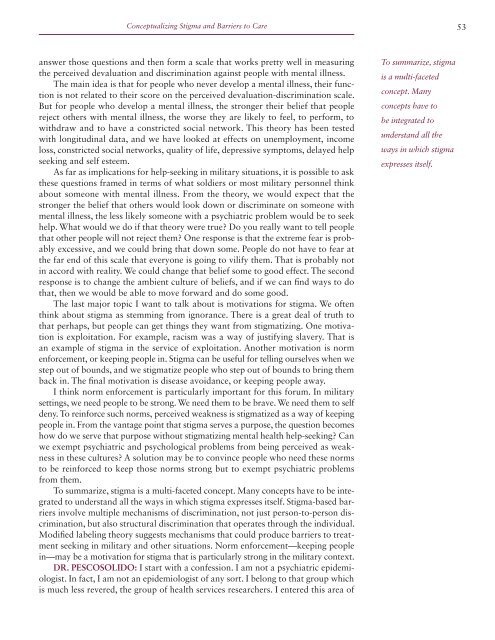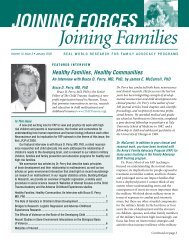stigma and barriers to care - Uniformed Services University of the ...
stigma and barriers to care - Uniformed Services University of the ...
stigma and barriers to care - Uniformed Services University of the ...
You also want an ePaper? Increase the reach of your titles
YUMPU automatically turns print PDFs into web optimized ePapers that Google loves.
Conceptualizing Stigma <strong>and</strong> Barriers <strong>to</strong> Care 53<br />
answer those questions <strong>and</strong> <strong>the</strong>n form a scale that works pretty well in measuring<br />
<strong>the</strong> perceived devaluation <strong>and</strong> discrimination against people with mental illness.<br />
The main idea is that for people who never develop a mental illness, <strong>the</strong>ir function<br />
is not related <strong>to</strong> <strong>the</strong>ir score on <strong>the</strong> perceived devaluation-discrimination scale.<br />
But for people who develop a mental illness, <strong>the</strong> stronger <strong>the</strong>ir belief that people<br />
reject o<strong>the</strong>rs with mental illness, <strong>the</strong> worse <strong>the</strong>y are likely <strong>to</strong> feel, <strong>to</strong> perform, <strong>to</strong><br />
withdraw <strong>and</strong> <strong>to</strong> have a constricted social network. This <strong>the</strong>ory has been tested<br />
with longitudinal data, <strong>and</strong> we have looked at effects on unemployment, income<br />
loss, constricted social networks, quality <strong>of</strong> life, depressive symp<strong>to</strong>ms, delayed help<br />
seeking <strong>and</strong> self esteem.<br />
As far as implications for help-seeking in military situations, it is possible <strong>to</strong> ask<br />
<strong>the</strong>se questions framed in terms <strong>of</strong> what soldiers or most military personnel think<br />
about someone with mental illness. From <strong>the</strong> <strong>the</strong>ory, we would expect that <strong>the</strong><br />
stronger <strong>the</strong> belief that o<strong>the</strong>rs would look down or discriminate on someone with<br />
mental illness, <strong>the</strong> less likely someone with a psychiatric problem would be <strong>to</strong> seek<br />
help. What would we do if that <strong>the</strong>ory were true Do you really want <strong>to</strong> tell people<br />
that o<strong>the</strong>r people will not reject <strong>the</strong>m One response is that <strong>the</strong> extreme fear is probably<br />
excessive, <strong>and</strong> we could bring that down some. People do not have <strong>to</strong> fear at<br />
<strong>the</strong> far end <strong>of</strong> this scale that everyone is going <strong>to</strong> vilify <strong>the</strong>m. That is probably not<br />
in accord with reality. We could change that belief some <strong>to</strong> good effect. The second<br />
response is <strong>to</strong> change <strong>the</strong> ambient culture <strong>of</strong> beliefs, <strong>and</strong> if we can find ways <strong>to</strong> do<br />
that, <strong>the</strong>n we would be able <strong>to</strong> move forward <strong>and</strong> do some good.<br />
The last major <strong>to</strong>pic I want <strong>to</strong> talk about is motivations for <strong>stigma</strong>. We <strong>of</strong>ten<br />
think about <strong>stigma</strong> as stemming from ignorance. There is a great deal <strong>of</strong> truth <strong>to</strong><br />
that perhaps, but people can get things <strong>the</strong>y want from <strong>stigma</strong>tizing. One motivation<br />
is exploitation. For example, racism was a way <strong>of</strong> justifying slavery. That is<br />
an example <strong>of</strong> <strong>stigma</strong> in <strong>the</strong> service <strong>of</strong> exploitation. Ano<strong>the</strong>r motivation is norm<br />
enforcement, or keeping people in. Stigma can be useful for telling ourselves when we<br />
step out <strong>of</strong> bounds, <strong>and</strong> we <strong>stigma</strong>tize people who step out <strong>of</strong> bounds <strong>to</strong> bring <strong>the</strong>m<br />
back in. The final motivation is disease avoidance, or keeping people away.<br />
I think norm enforcement is particularly important for this forum. In military<br />
settings, we need people <strong>to</strong> be strong. We need <strong>the</strong>m <strong>to</strong> be brave. We need <strong>the</strong>m <strong>to</strong> self<br />
deny. To reinforce such norms, perceived weakness is <strong>stigma</strong>tized as a way <strong>of</strong> keeping<br />
people in. From <strong>the</strong> vantage point that <strong>stigma</strong> serves a purpose, <strong>the</strong> question becomes<br />
how do we serve that purpose without <strong>stigma</strong>tizing mental health help-seeking Can<br />
we exempt psychiatric <strong>and</strong> psychological problems from being perceived as weakness<br />
in <strong>the</strong>se cultures A solution may be <strong>to</strong> convince people who need <strong>the</strong>se norms<br />
<strong>to</strong> be reinforced <strong>to</strong> keep those norms strong but <strong>to</strong> exempt psychiatric problems<br />
from <strong>the</strong>m.<br />
To summarize, <strong>stigma</strong> is a multi‐faceted concept. Many concepts have <strong>to</strong> be integrated<br />
<strong>to</strong> underst<strong>and</strong> all <strong>the</strong> ways in which <strong>stigma</strong> expresses itself. Stigma-based <strong>barriers</strong><br />
involve multiple mechanisms <strong>of</strong> discrimination, not just person‐<strong>to</strong>‐person discrimination,<br />
but also structural discrimination that operates through <strong>the</strong> individual.<br />
Modified labeling <strong>the</strong>ory suggests mechanisms that could produce <strong>barriers</strong> <strong>to</strong> treatment<br />
seeking in military <strong>and</strong> o<strong>the</strong>r situations. Norm enforcement—keeping people<br />
in—may be a motivation for <strong>stigma</strong> that is particularly strong in <strong>the</strong> military context.<br />
DR. PESCOSOLIDO: I start with a confession. I am not a psychiatric epidemiologist.<br />
In fact, I am not an epidemiologist <strong>of</strong> any sort. I belong <strong>to</strong> that group which<br />
is much less revered, <strong>the</strong> group <strong>of</strong> health services researchers. I entered this area <strong>of</strong><br />
To summarize, <strong>stigma</strong><br />
is a multi‐faceted<br />
concept. Many<br />
concepts have <strong>to</strong><br />
be integrated <strong>to</strong><br />
underst<strong>and</strong> all <strong>the</strong><br />
ways in which <strong>stigma</strong><br />
expresses itself.




